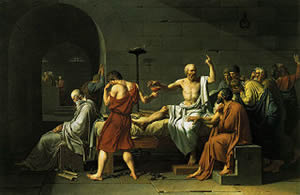To Socrates, Hypocrisy is Unwise
Alexander S. Peak
Also available in .txt and .pdf.
4 March 2004
Socrates never considered himself to be a wise man. Quite to the contrary, he considered himself to lack much wisdom. However, in his approach to life and to philosophy, he did strive for wisdom. To do this, he particularly avoided those things he viewed to be unwise, and to impede him on the track to wisdom. In this essay, I will compare Socrates’s philosophical approach to life, as displayed in the Euthyphro, the Apology, and the Crito, in order to show that Socrates viewed hypocrisy to be unwise.
In the Euthyphro, Euthyphro is a religious fellow that sees himself as more important than his fellow man because of the superior knowledge in regards to piety that he believes himself to hold. He shows this in saying, “I should be of no use, Socrates, and Euthyphro would not be superior to the majority of men, if I did not have accurate knowledge of all such things” (4e–5a). This, however, is a hypocritical approach for Euthyphro to take because, as Socrates demonstrates, Euthyphro does not in fact hold the knowledge of what is piety, and hence does not hold an aspect of wisdom that he hypocritically views others as subordinate for not also having.
Socrates achieves this demonstration by employing his tried and true method of questioning people, known as the Socratic Method. Through the course of the dialogue, he asks Euthyphro a series of questions concerning the nature of piety. Euthyphro is never able to give Socrates a concrete answer, showing that Euthyphro’s knowledge of piety was as basic as Socrates’s. In the end, Euthyphro’s arguments come full circle, without either Socrates or Euthyphro learning what piety’s form is (15b–e4). As Socrates understands, assuming to hold a certain wisdom that one does not truly hold will only serve to inhibit you from gaining any true wisdom. This was the case with Euthyphro, in that he thought himself so wise that he was unable to substantially gain any understanding of the true nature of piety. Hence, hypocrisy, as Socrates believed, inhibits people from becoming wise.
The conflict of wisdom v. hypocrisy can also be seen in the Apology. In the Apology, which is an account of Socrates’s trial, Metetus claims to want to help the youth of Athens (24d), whom he claims Socrates has supposedly corrupted (25a). On top of this, Metetus claims that Socrates has intentionally corrupted the youth (25d). Socrates, seeing Meletus as a hypocrite, believes that it is really Meletus that corrupts the youth through lack of concern for their wellbeing spiritually (25b–c4). He showcases Meletus’s hypocrisy in countering Meletus’s charge by saying, “You have made it sufficiently obvious, Meletus, that you have never had any concern for our youth; you show your indifference clearly; that you have given no thought to the subjects about which you bring me to trial” (25c).
In Socrates’s opinion, Meletus’s hypocrisy in this manner has actually hurt the youth, rather than helped. He compares himself to a horse-breeder that helps horses, while most others corrupt horses (25b). In Socrates’s opinion, he helps the youth by showing them that they, like him, are not wise—but he does not teach them anything (33b). Meletus’s hypocrisy in turn hurts the youth by attempting to rid Athens of a man who helps the youth spiritually to understand that they are not wise like the gods. It is this hypocrisy that Meletus shows that also blinds him from this truth that Socrates views himself to profess, thereby restraining Meletus from becoming wise.
In the Crito, we see Socrates specifically abstain from hypocrisy, showing that Socrates had some conscious disdain therefor. In the Crito, Crito, a long-time friend of Socrates, comes to Socrates’s jail cell to encourage him to escape (44b–c). Crito is wealthy enough that he could pay off the guards to look the other way as Socrates makes his escape, thus sparing Socrates’s life from its fate of hemlock. Socrates, however, repeatedly refuses Crito’s offer. Socrates argues that it would be foolish to fear death, as the fear of death implies a degree of knowledge on the subject that one cannot truly possess (52c, 37b–c, 40b–41c, 42). Socrates sees it as hypocritical for one to act like she or he knows something she or he do not, and that fearing death is inherently unwise for this reason. Socrates would see it as hypocritical in himself if he were to, after having lived a life based on showing people that they were not wise, to suddenly assume himself so wise as to know what comes after death. This is one of the main reasons he turns down Crito’s offer.
He also knew that attempting to escape, like a criminal in the night, would undermine his entire belief structure. This would do no good in encouraging others to follow his path in showing people that they are not wise. If anything, it would undermine that goal completely. Hypocrisy, in this case, would directly cause, not only displeasure for himself, but the Socratic Method to possibly fall into disrepute and die, undermining everything he had worked toward in life, in his attempt to help people become more spiritual in their understanding that they, too, lack wisdom.
Although he never viewed himself as wise, other than to have a basic “human wisdom” (20d), Socrates understood that to follow a foolhardy path of hypocrisy would do no good in furthering his cause and attempt to gain wisdom. Hence, for this reason, he viewed hypocrisy to be, not only a route to foolishness and away from wisdom, but also a hindrance to anyone attempting to become wise(r).
Reference Item
Plato. 2002. Five Dialogues, second edition. Translated by G. M. A. Grube. Indianapolis, IN: Hacket Publishing Company, Inc.

